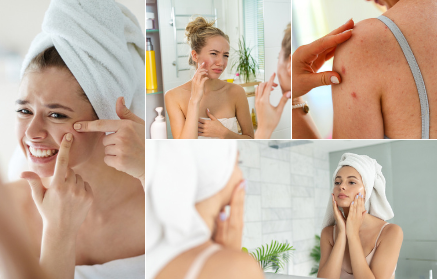Table of Contents
Red spots, black dots, whiteheads, painful pimples – all of these fall under an unpleasant and annoying problem called acne. It has more serious and less serious forms, but sometimes it requires even the intervention of a doctor. It is most often a problem for adolescents, but it is quite common for adults either.
What is acne?
Acne is a chronic skin disease where the sebaceous glands are producing an excessive amount of sebum which leads to clogging of the pores (hair follicles). But clogged pores are just the beginning. These places can become inflamed – an ideal environment for the multiplication of bacteria. [1]
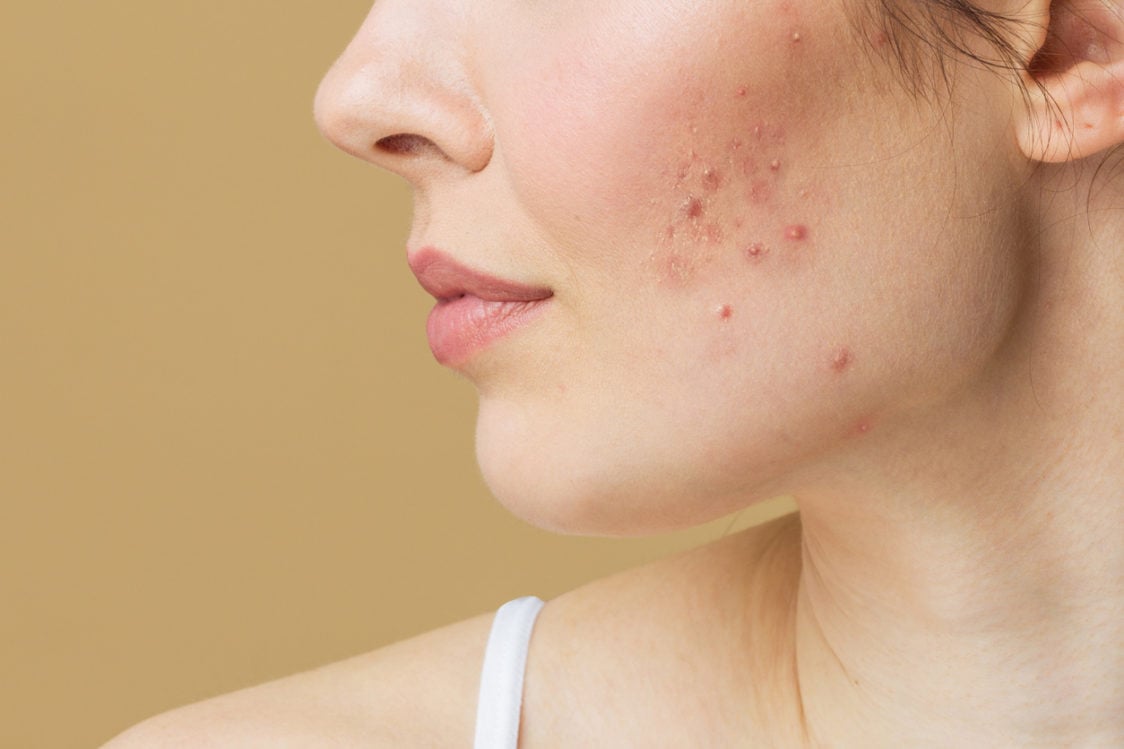
What are the causes of acne?
Acne partly depends on your genetics. However, it is also significantly affected by hormonal changes (especially the excessive production of male hormones androgens). Changes in hormone levels are the cause why the acne is most common during puberty. Women also know from experience that the production of acne changes in the various stages of the menstrual cycle, during pregnancy or during the onset of menopause. This health issue is also common in athletes who use anabolic steroids. [17]
The surrounding environment (environmental pollution, humidity, etc.), stress, cosmetics or lifestyle also contribute to the formation of acne. [6]
Types of acne
- Comedonal Acne is characterized by black or white spots on the skin (called comedones), this degree of acne is not yet inflammatory and is the least severe
- Papulopustular Acne is manifested by inflamed red pimples, often with a white purulent tip
- The most severe form is cystic acne, when large inflamed cysts occur, which often leave scars
Acne does not only appear on the face, but can bother you on the back, neck, shoulders or scalp, for example.

How to get rid of acne?
Remember that it is a disease, not just an aesthetic problem. Therefore, especially for more serious types, follow the recommendations of a dermatologist who will help you with acne treatment. It is often a long run and in some cases it might never go away. However, it will always be possible to at least alleviate it. You can definitely help yourself by focusing on the factors you can influence.
1. Sleep more and try to reduce stress
You may not be surprised that acne is next on the list of problems that can be exacerbated by stress. The inflammation present is promoted by hormones (e.g. cortisol and the earlier mentioned androgens), which are formed in larger amounts during stress and can also be stimulated by substances which are formed directly in the skin in response to stress. [5,14]
You might be interested in these products:
How to reduce stress in everyday life?
- Move around. Exercise has excellent stress-reducing effects. Walk regularly, run, work out at home or in the gym, dance, swim, do what you enjoy. Stress can be reduced by both aerobic and anaerobic physical activity. [8]
- Sleep at least 7 hours a day. Don’t forget about its quality as well. Insufficient and poor sleep is also considered a serious stress factor. [12]
- Relax with activities that make you happy.
- Try various relaxation activities, such as meditation or yoga.
- Expose yourself to cold. Cold showers can help you lower your stress hormone cortisol or increase your serotonin levels to keep you in a better mood. [15]
If you have trouble sleeping, read our article What to Do if Sleep Doesn’t Work? Focus on These 7 Types of Rest.
2. Improve your nutrition. Cut back on sugar and add some seawater fish.
The effect of nutrition on acne is a widely discussed topic. Currently, science is inclined to the fact that a diet with a high glycemic index, which contains a high amount of rapidly absorbed carbohydrates and significantly increases blood sugar (so-called glycemia), can have a negative effect. [2,4]
You can reduce your blood glycemic index with these tips:
- Limit foods containing simple sugars (confectionery, carbonated drinks, sweetened dairy products, juices, cakes, desserts, etc.).
- Include higher amounts of fibre in the form of whole grains, legumes, vegetables and fruits.
- Avoid white bread, large portions of dried fruit or breakfast cereals (it will help if you replace those chocolate cereals with oats or sprinkled muesli).
- Make sure your diet is rich in protein (dairy products, lean meat, fish, etc.) and quality sources of fat (vegetable oils, nuts, seeds).
Add more omega-3 fatty acids to your diet
Acne issues could also be alleviated by the anti-inflammatory effect of omega-3 fatty acids. You get omega-3 fatty acids by regular consumption of fatty seawater fish (salmon, mackerel, trout, herring, etc.), but also with the help of flax or chia seeds, walnuts, soybean or rapeseed oil. If fish is not a regular part of your diet, it would be worth using omega-3 fatty acids supplements. [2,4]
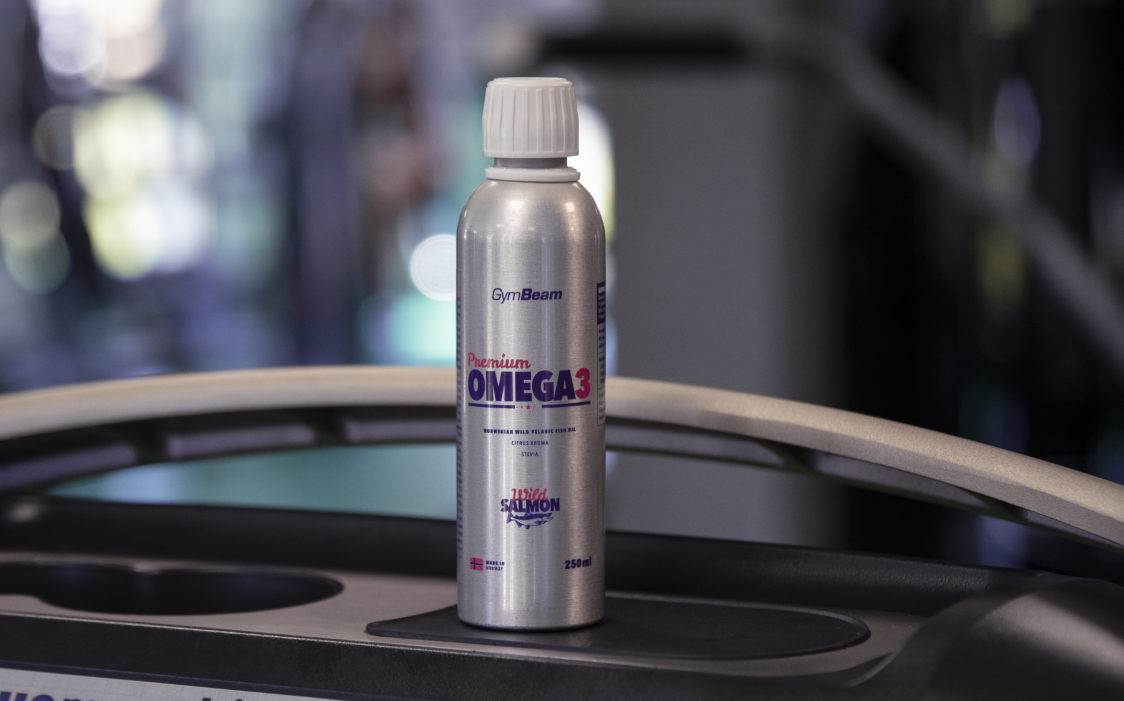
What vitamins can help you with acne?
So far, no vitamins or minerals are known to miraculously help. The best thing to do is take care of a balanced diet with enough vegetables and fruits to get the widest possible range of nutrients and keep your skin healthy.
3. Make sure you drink enough water to keep your skin healthy and hydrated
Sufficiently hydrated skin is healthy skin. While there is no convincing evidence that drinking a sufficient amount of water reduces the incidence of acne, we know that water is needed for proper processes in the body, including those in the skin. [9]
Therefore, keep this in mind and drink 30 – 45 ml of fluids per kilogram of your weight daily. Imagine a girl named Helen who weighs 60 kg. Helen should receive 1800 – 2700 ml of fluids daily. [10]

Maybe she would be surprised that she should drink so much. The good news is that she doesn’t have to, because up to 20% of her daily fluid intake is normally in the food. She therefore has to drink 1440 – 2160 ml of fluids. Ideally, she should drink the recommended amount in the form of pure water, slightly sparkling mineral water or unsweetened teas.
The need for fluids increases with physical activity or warm and humid weather. It also varies based on how much a person sweats. With heavy sweating during exercise, an athlete can lose up to 3 litres of fluids per hour. [10]
If you are more interested in the topic of water intake, definitely do not miss our article How Insufficient Water Intake Affects Your Health.
4. Maintain an optimal weight, obesity does not benefit your skin
It is now common knowledge that keeping your weight in the optimal range prevents a large number of diseases. But you may be surprised that this also applies to acne. Obesity is characterized by insulin resistance and overproduction of IGF-1 (Insulin Like Growth Factor 1), which are also involved in the formation of acne. In addition, hyperandrogenism (increased levels of male sex hormones) can be observed in obese women, and occurs, for example, in the form of polycystic ovary syndrome (PCOS). [3,12,16]
The optimal weight is specified as BMI (Body Mass Index) in the value of 20 – 25 kg/m2 . Since BMI tells us nothing about body composition and the amount of muscle and fat mass, it is good to remember that for a woman it is advisable to have about 21 – 31% body fat (more than 35% already counts as obesity), while for men it is 12 – 25% body fat (more than 25% already indicates obesity). [18–19]
Maintain weight by combining proper nutrition, adequate physical activity, enough high-quality sleep, and reducing stress factors in daily life.
If you are more interested in the topic of weight loss, read our article Caloric Deficit: How to Lose Weight and Have Your Own Life.
5. Avoid cigarettes, they also affect the skin
Perhaps there is no body part that is not negatively affected by smoking. Skin, which is the largest organ of the body, is also affected by its harmful effects. Smoking probably stimulates the inflammatory processes that are involved in acne. [13]
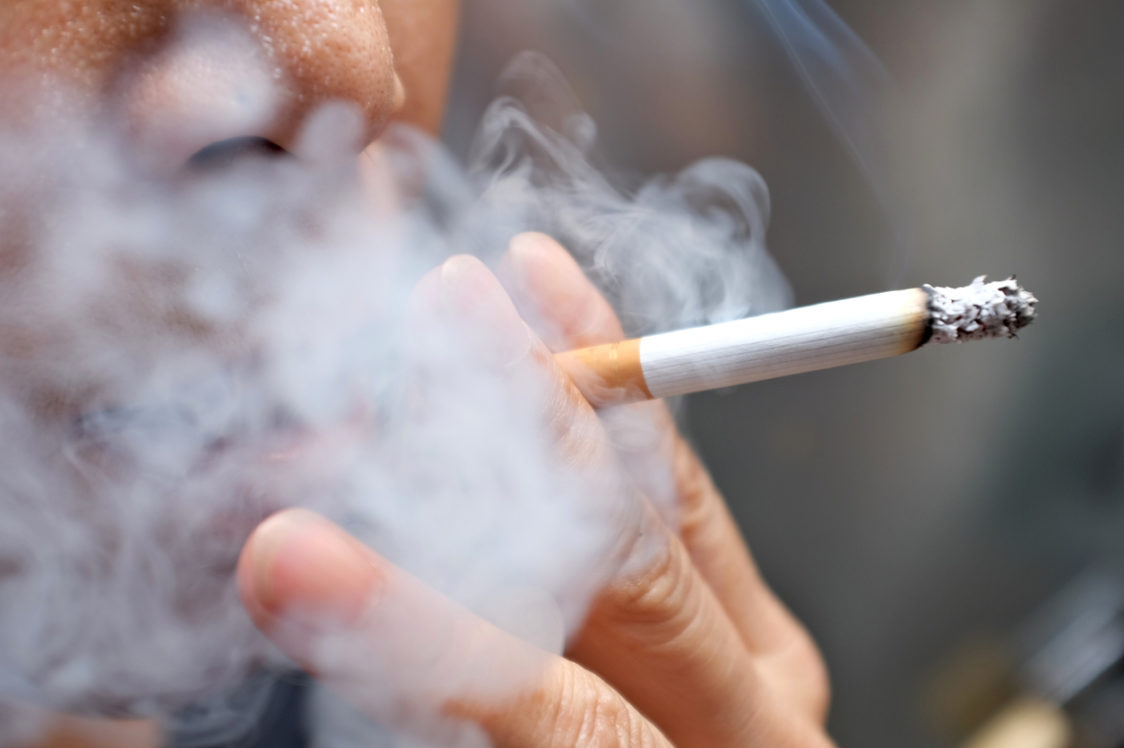
6. Clean your skin properly and gently, choose the cosmetics you use wisely
Areas of skin with acne are not dirty, as many people think, but they are sensitive. Therefore, it is essential that someone with this problem takes care of proper, gentle hygiene, which doesn’t harm sensitive skin. [6]
How to properly care for your skin?
- Do not touch your face more than necessary. No scratching or smearing your dirty hands all over your face – don’t irritate the acne unnecessarily.
- Ideally, use those cleansers that are described as suitable for acne prone skin. You can’t ever go wrong asking a dermatologist or pharmacist for advice. [7]
- Do not use peelings and soaps. Improper cosmetics can support the inflammatory processes. Also avoid essential oils and oil-containing cosmetics, as the oil clogs the pores. [7,12]
- After washing, just tap dry your face, don’t rub it.
- Try to use as little cosmetics as possible, limit yourself in using make-up, creams, etc. [7]
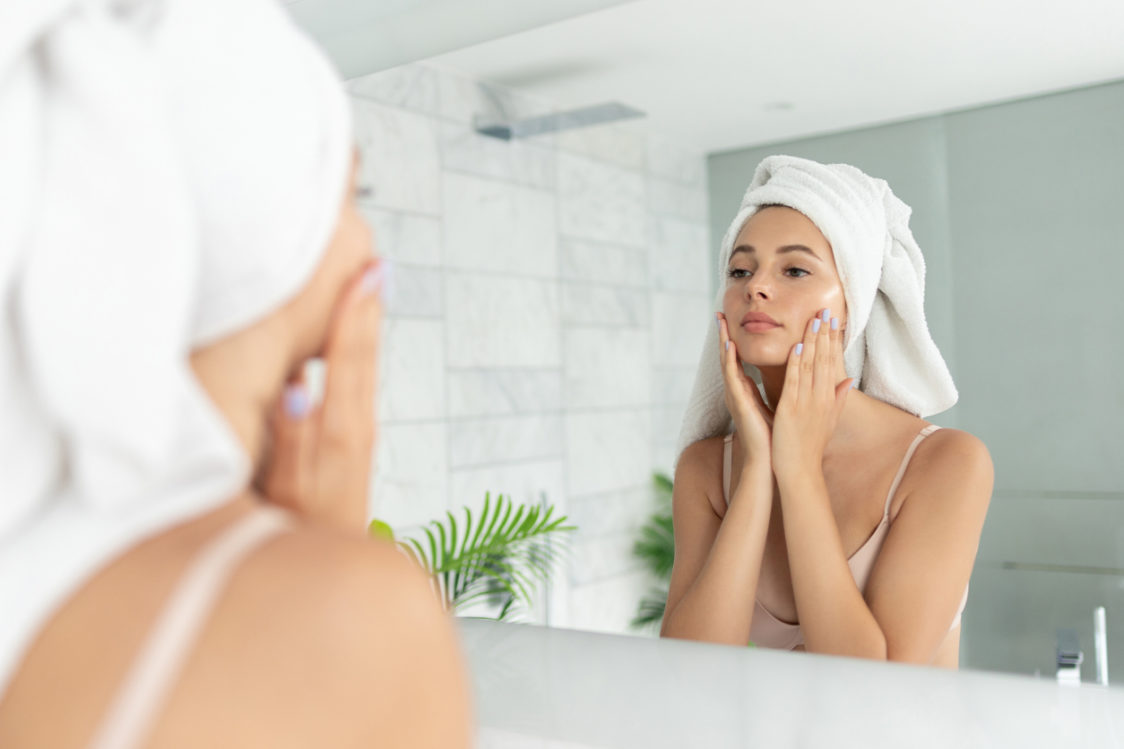
As we mentioned above, acne can appear not only on the face, but also on the back, shoulders and other parts of the body, so adjust your clothing accordingly. Wear clothing that is loose and breathable so as not to irritate the skin with excessive sweat.
And what about pimple popping? Should acne be squeezed out?
As much as it attracts you and you want to get rid of them, do not squeeze the pimples. Try to touch them as little as possible. Popping will only make the problem worse and increase the chance that you will have scars and acne marks on your skin.
What should you remember?
Acne is a complicated health problem that is caused by a number of factors. From genetic predisposition, through hormonal and environmental influences to factors that affect our lifestyle and we can influence them ourselves. Self-treatment may not always be effective and the solution may end up being the help of a dermatologist. However, always make sure that you do right what you are in control of. In addition to a healthy body weight, pay attention to long and high-quality sleep, proper diet and a sufficient hydration, reduce stress, say goodbye to smoking and last but not least, take good care of your skin.
[1] CETKOVSKÁ - P. Acne vulgaris – https://www.internimedicina.cz/pdfs/int/2003/12/09.pdf
[2] CONFORTI, C. - Acne and diet: a review – https://onlinelibrary.wiley.com/doi/abs/10.1111/ijd.15862
[3] DARLENSKI, R. - The Link Between Obesity and the Skin – https://www.frontiersin.org/articles/10.3389/fnut.2022.855573/full
[4] FIEDLER, F. - Acne and Nutrition: A Systematic Review – https://pubmed.ncbi.nlm.nih.gov/27136757/
[5] CHIU, A. - The Response of Skin Disease to Stress: Changes in the Severity of Acne Vulgaris as Affected by Examination Stress – https://jamanetwork.com/journals/jamadermatology/fullarticle/479409
[6] KNUTSEN-LARSON, S. - Acne Vulgaris: Pathogenesis, Treatment, and Needs Assessment – https://pubmed.ncbi.nlm.nih.gov/22117871/
[7] LEUNG, A.K. - Dermatology: how to manage acne vulgaris – https://www.ncbi.nlm.nih.gov/pmc/articles/PMC8510514/
[8] MIKKELSEN, K. - Exercise and mental health – https://pubmed.ncbi.nlm.nih.gov/29150166/
[9] PALMA, L. - Dietary water affects human skin hydration and biomechanics – https://www.ncbi.nlm.nih.gov/pmc/articles/PMC4529263/
[10] RESEARCH, I. of M. (US) C. on M.N. - MARRIOTT, B.M. – Water Requirements During Exercise in the Heat – https://www.ncbi.nlm.nih.gov/books/NBK236237/
[11] SPOLEČNOST PRO VÝŽIVU – Referenční hodnoty pro příjem živin. . v ČR 1. vydání. vyd. Praha, 2011. ISBN 978-80-254-6987-3.
[12] YANG, J. et al. – A Review of Advancement on Influencing Factors of Acne: An Emphasis on Environment Characteristics. – https://www.ncbi.nlm.nih.gov/pmc/articles/PMC7527424/
[13] ZHANG, J.-Z. et al. – Association between acne and smoking: systematic review and meta-analysis of observational studies. – https://www.ncbi.nlm.nih.gov/pmc/articles/PMC8367059/
[14] ZOUBOULIS, C.C. - BÖHM, M. – Neuroendocrine regulation of sebocytes – a pathogenetic link between stress and acne. – https://pubmed.ncbi.nlm.nih.gov/15507110/
[15] Psychology Today – A Cold Splash–Hydrotherapy for Depression and Anxiety. – https://www.psychologytoday.com/us/blog/inner-source/201407/cold-splash-hydrotherapy-depression-and-anxiety
[16] Wound Management & Prevention – An Overview of Dermatological Conditions Commonly Associated with the Patient with Obesity. 2006. Vol. 52, no. 6. – https://www.hmpgloballearningnetwork.com/site/wmp/content/an-overview-dermatological-conditions-commonly-associated-with-obese-patient
[17] Mayo Clinic Staff – Understanding the risks of performance-enhancing drugs. – https://www.mayoclinic.org/healthy-lifestyle/fitness/in-depth/performance-enhancing-drugs/art-20046134
[18] What is a healthy body fat percentage? – In Tanita Europe BV – https://tanita.eu/blog/healthy-body-fat-percentage
[19] D C Frankenfield 1, W A Rowe, R N Cooney, J S Smith, D Becker – Limits of body mass index to detect obesity and predict body composition – https://pubmed.ncbi.nlm.nih.gov/11165884/

